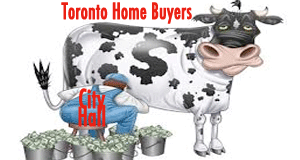| Mary Gallagher—
With Toronto City Council meeting tomorrow to give final approval to the City’s 2014 Budget, the Toronto Real Estate Board (TREB) is telling Councillors that the proposed budget’s reliance on the Toronto Land Transfer Tax poses risks and that City Council should begin cutting this tax instead. TREB’s views are being echoed by thousands of Torontonians who have been contacting City Councillors by email and other means. “Relying on an unpredictable revenue source like the Land Transfer Tax, which fluctuates with the City’s real estate market, poses risks. The proposed budget that City Council will be debating relies on this unpredictable revenue more than ever before. Torontonians deserve better than that and City Council should be focusing on predictable budgeting options and cutting the Land Transfer Tax, instead,” said Dianne Usher, President, Toronto Real Estate Board. When the City’s 2014 budget process began last November, City staff recommended budgeting $335 million in revenue from the Land Transfer Tax for 2014, which allowed for a buffer in revenue expectations to account for potential fluctuations in the real estate market. Since then, the City’s Budget Committee and Executive Committee made amendments to the proposed Budget to increase the budgeted revenue from the Land Transfer Tax by over $20 million, exposing the City’s budget to greater risk if real estate market trends change. In a letter sent to City Council, TREB has warned City Councillors of this risk, and called for City Council to cut the Land Transfer Tax instead, and focus on predictable budgeting options. “The Home Buying Tax hurts people when they can least afford it. It penalizes people like growing families or retirees. City Council should do its part in keeping Toronto affordable by providing relief from the Home Buying Tax for all home buyers,” said Dianne Usher, President, Toronto Real Estate Board. TREB has told Councillors that eliminating the Land Transfer Tax on the first $400,000 value of a property, at a minimum, for all home buyers, would be a good first step in providing relief from this tax. Setting this threshold at $400,000 would ensure that first-time home buyers would be no worse off (Currently, first-time home buyers are eligible for a rebate on the Land Transfer Tax payable up to a $400,000 property). TREB also told Councillors that if a lower threshold is preferred, then the current rebate for first-time home buyers should be maintained, and potentially expanded, and indexed to inflation going forward. With the current average price in Toronto at approximately $570,000, TREB believes that the current first-time home buyer rebate is inadequate because it has not kept pace with inflation. “Even first-time home buyers purchasing below average-priced properties are currently being forced to pay thousands of dollars in Toronto Home Buying Tax, because the City’s first-time home buyer rebate has not kept pace with inflation,” said Von Palmer, TREB’s Chief Government and Public Affairs Officer. TREB has also pointed out to City Council that the current Land Transfer Tax rates are regressive because they force people purchasing below-average priced homes to pay the highest tax rate. Currently, the highest Land Transfer Tax rate kicks in on homes priced over $400,000 for ALL home buyers, considerably lower than the City’s current average price of approximately $570,000 and rising. “The Home Buying Tax has become more and more regressive as home prices have increased, because its tax rates have not been adjusted with inflation. Someone purchasing a home priced below the City’s average price is being charged the highest tax rate. That’s not right,” said Palmer. TREB also told City Council that potential new real estate transactions resulting from a reduction in the Land Transfer Tax could help off-set any impact to the City’s budget. “Potential growth in home sales resulting from a Land Transfer Tax rate reduction could help offset the impact to the City’s budget. Research by the C.D. Howe Institute has shown that the Land Transfer Tax has dampened home sales in Toronto by 16 percent annually. If a Land Transfer Tax rate reduction helps to reduce or reverse this effect, the resulting extra home sales, which may not have occurred otherwise, could generate new off-setting revenue for the City, while bringing more balance into the market,” said Usher. TREB is encouraging the public to visit www.LetsGetThisRightToronto.ca to tell City Council to do the right thing and phase out the Home Buying Tax. |
 TheBulletin.ca Journal of Downtown Toronto
TheBulletin.ca Journal of Downtown Toronto


